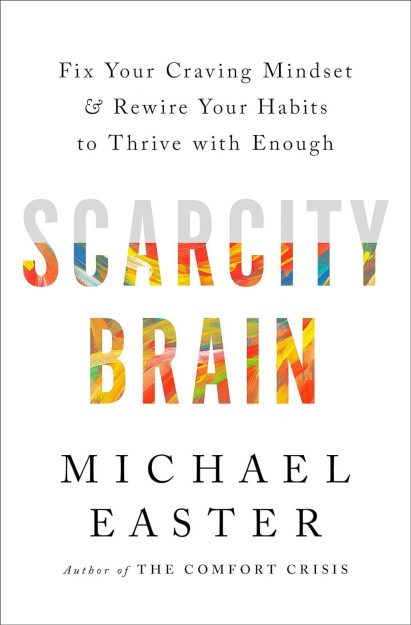Michael Easter is no stranger to discomfort. He explored the subject intimately in his first book, The Comfort Crisis, which detailed how the luxury and ease of modern amenities have shrunk both our comfort zones and capabilities. In his newest work, Scarcity Brain, Easter traveled from Iraq to the Amazon looking for clues about why we crave, including a week spent in a Benedictine monastery engaging in manual labor to get a better sense of how work, community, and reflection can stir us.
Scarcity Brain is about the way we are wired to accrue far more food, information, stuff, influence, and pleasure than we need. It explores how the concept of “evolutionary mismatch”—in which traits that were advantageous thousands of years ago are destructive in a world of abundance—impacts our lives on a granular level.
The upshot of Easter’s willingness to dive deeply into discomfort is what it reveals about how humans have survived and thrived, and the way we’re hardwired to crave. As Easter noted when we spoke, this knowledge can be the first step toward interrupting the habit loops that can cause us to feel helpless in the face of manifold desires. Call it a modern take on the four noble truths—suffering is mitigated when craving diminishes.
You write, “Decades of research have found that many of our biggest problems—at both the personal and societal levels—come from our modern ability to easily fulfill our ancient desire for more.” How can taking the long view and recognizing our biological context positively impact our everyday actions? We have drives that used to serve us in the past but oftentimes no longer do. Or, rather, they push us into “too much.” Understanding why we tend to overeat, overbuy, or overscroll can lift some guilt—you’re not a bad or lazy person. Rather, you’re doing what our species has always done. But we’re now on a different playing field.
I think becoming aware of the evolutionary origins of most cravings and excesses can alleviate guilt and start to help you understand the issue. Even just developing awareness of a behavior often changes it (a phenomenon known as “the Hawthorne effect”). In other words, once you learn how the machine works, you can better decide how, and if, you want to use the machine. I now understand why I fall into scarcity loops of, say, checking social media and reading emails. Realizing that this is just my brain playing an ancient game that doesn’t make sense, applied to the current context, lifts some guilt and helps me spend my time elsewhere.
This ancient game evolved to keep us alive. For example, finding food falls into the scarcity loop. Hunting and gathering is a random rewards game that we had to play to survive in the past. A psychological researcher I spoke with explained that this likely explains why unpredictable rewards are still today more attention-getting to us than predictable rewards.
Your book details the many arenas in which our rampant desire has become destructive, from drug abuse to our relationship with food to consumerism. What is the most concerning example of scarcity brain in contemporary society, and is there any reason to be hopeful? It depends on how you want to measure it and how you calculate it. For example, if you went with what most shortens lives, it would likely be food. If you went with sheer emotional destructiveness (i.e., impact rather than range), it might be drug addiction. Really, I don’t think anyone knows.
So my answer is the worst rampant desire is the rampant desire that’s hurting you, the person reading this. Most people have some habit that impacts them negatively. Beginning to get to the root of that can change your experience of life and lead you to live it better.
What would you say to those who would argue that progress, innovation, and affluence have all arisen thanks to our voracious appetites? It’s totally true. I consider the problems I’m pointing out in my book “good problems.” I’d prefer to have to think about not eating too much rather than not getting enough.
But whether a voracious appetite is good or bad depends on context. For an underweight person: good! For a morbidly obese person: bad! So I think, in a way, we’ve hit a point where many of our advances clash with our evolutionary drives in a way that can lead us into trouble. This goes back to the mismatch theory. Abundance is great, but it has led to its own set of problems.
You write, “Permanent and lasting satisfaction lies in finding enough.” But we seem to keep moving the goalposts on what “enough” entails. If we are wired to always want more, how can we accurately determine what is enough? I don’t think we can. I think it will always be shifting based on our experience. The book mostly asks people to understand where we are now and to do the tough work that will help them find what enough is for them—which could be constantly changing across a life span. I wish I had exactitudes, but life doesn’t work like that.
In the context of today, most of what improves humans isn’t easy. It’s usually somewhat challenging, at least in the short term. But it gives us long-term rewards. So the tough work is unpacking why you have a certain behavior in the first place, then taking action to change it. I don’t believe humans do anything that doesn’t benefit them somehow, but our tendency is to choose short-term rewards over long-term growth. And, in fact, choosing short-term rewards can often hurt us in the long run. So getting out of that cycle is challenging.
For me, “enough” is simply feeling more engaged and focused on longer-term goals I deem more meaningful. I think that many of the times where we crave more—excess food, another purchase, checking and rechecking social media or email—we’re simply finding a quick relief from something else like frustration or boredom.
I’m not saying to avoid buying, snacking, or using social media. But I do think overdoing them is often a symptom. Getting more engaged in something big and meaningful transitions our attention to longer-term rewards and makes us less likely to crave and consume in ways we regret. It’s taking a “gear not stuff” mindset and applying it across the board. For example, I’ve found when I’m most engaged in writing, my social media usage goes down, I don’t snack just to snack, and I don’t buy crap I don’t need.
You write, “We seem to believe our internal and external conditions will be perfect and that we’ll be able to finally ‘arrive’ and rest once we fulfill our next want. This is a delusion.” Do you see the practice of mindfulness as a potentially useful tool for recognizing this delusion and responding to scarcity brain? Yes! I think mindfulness can absolutely help people recognize the nature of the beast. I don’t think it’s the only path, but it’s a time-tested one, with new research confirming some benefits. I do think we’re in a phase of discourse and research where mindfulness has become a sort of “answer for everything.” I don’t think it’s going to work for every person, for a variety of reasons that may be cultural, social, or biological. People should try mindfulness and whatever else they think might help them in order to find something that works.
Your time at the Benedictine monastery revealed the link between contemplation and contentment. Aside from donning robes and taking monk vows ourselves, how can we tap into that quietude on a daily basis? This readership, I’d imagine, would do well with meditation. In addition, time in nature is helpful (that’s what helps me most). For others, it might be traditional prayer. Or helping others. Effectively, asking the question, “How can I get out of myself?”
Meditation asks us to do that by contemplating what the “self” even is. Time in nature shows us that we’re part of something much larger—it inspires awe and helps us build perspective by making us realize how small our selves really are. Helping others gets us out of our own selves and leads to deeper rewards and satisfaction than, say, buying something on Amazon. Really, my message is just find whatever way of getting out of yourself gives you benefits. Try it all. Know that trying isn’t always going to be easy. As you see what works, continue with what resonates with you.
What have you found to be the most effective tool for fixing the craving mindset in your own life? Taking on experiences that build perspective and help others. My work forces me to travel into austere environments. Those are very perspective-giving. I then try to translate those travels and ensuing research around what they mean in the “big picture” into something that I hope can help others. I get a lot of great messages from readers that remind me why I do the things I do, which helps me keep my eye on the right ball. My experiences have made me really appreciative of what I have.

Thank you for subscribing to Tricycle! As a nonprofit, we depend on readers like you to keep Buddhist teachings and practices widely available.
